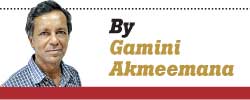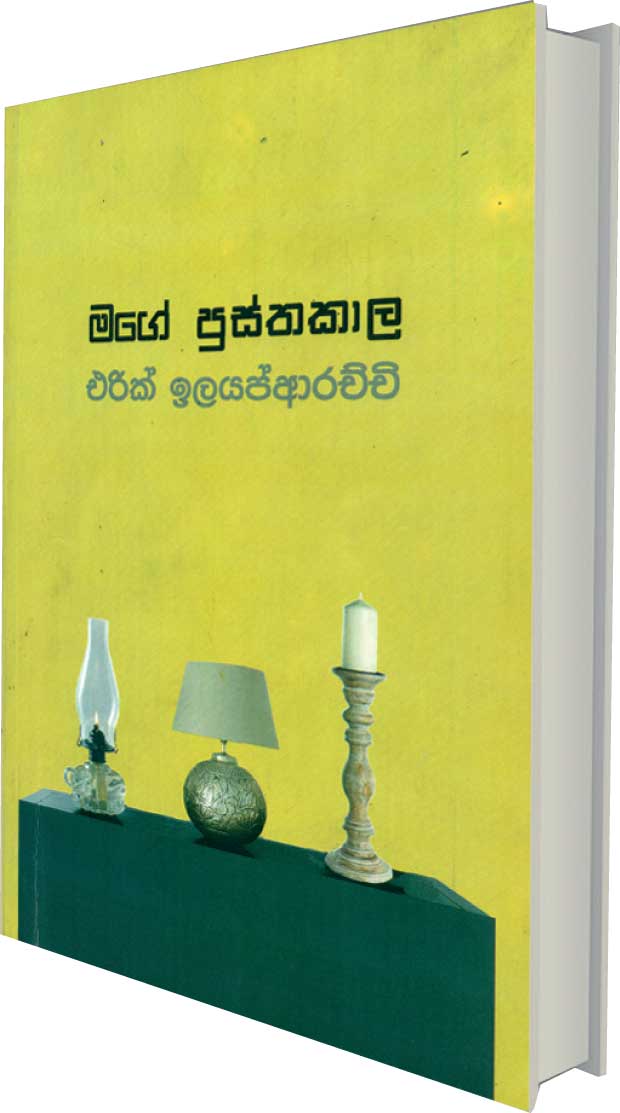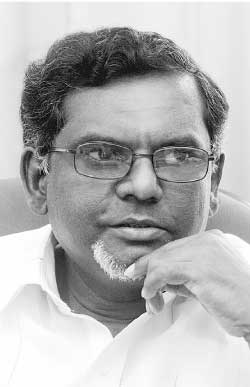Reply To:
Name - Reply Comment
Last Updated : 2024-04-18 19:11:00
 Eric Ilayaparachchi’s books are deceptive to look at. His non-fiction works and literary criticism, at any rate, are sometimes slim. But the amount of information packed into 100 pages or so would be voluminous. ‘Mage Pustakala’ (My Libraries) a recent book by this prolific author, is typical.
Eric Ilayaparachchi’s books are deceptive to look at. His non-fiction works and literary criticism, at any rate, are sometimes slim. But the amount of information packed into 100 pages or so would be voluminous. ‘Mage Pustakala’ (My Libraries) a recent book by this prolific author, is typical.
This 120 page book reads like a guided tour of every library which ever existed in Sri Lanka plus several from around the world. If the author has missed a few, it may be because here is a writer in a mighty hurry, even as he leafs through books, manuscripts, lives and anecdotes and an infinite number of book shelves.
His quest begins in Negombo, the author’s place of birth, and shifts through Colombo, Galle and other towns and then on to India, Sweden and Washington DC. Along with these, there are the one-man collections often leading a perilous existence, reflecting the precarious nature of their owners’ lives – from the friend forced to sell part of his invaluable collection every time he moves from one boarding house to another, to those waging heroic struggles with leaking roofs, mice, silverfish and financial drain... but never admitting defeat.
Piles of books crowd this area like tiles on the ground after a roof is dismantled. The author’s love of and feel for books is obvious; you can actually smell them. But, in the author’s view, people are as important – the people whose home libraries often vanished with them, dusty collections looking for book loving owners in vain. From obscure librarians to poets, scholars, activists and national heroes, book lovers are the author’s truest heroes, their books the dusty, yellowing armoury with which they battled ignorance and intellectual oblivion.
One can discern a degree of romanticizing here. But Eric Illayaparachchi is a romantic writer, and that is to his credit. Many of the best known works of the world’s classical literature were written by romantics
One thing leads to another. Close to the Negombo home where Eddie Jayamanne and Rukmani Devi lived, Sinhala scholar Don Abiram Gamhewa had his ancestral home filled with books. This area is associated with Munidasa Kumaratunga and Walisinha Harischandra as well. In other words, libraries abounded. At the Gamhewa household, the author discovers an early American edition of Fontamara, a work by Italian novelist and politician Ignazio Silone (Secondino Tranquilli) – “the sort of book left alone by ladies reading Victorian novels.” This is in addition to works by Hela Havula writers, and a copy of ‘The World’s Best Photographs’ owned by D. A. Gamhewa. 
He starts his search as a schoolboy, when in a Buddhist temple, a chance encounter with a disused book collection makes a deep impression on him. In the Catholic school run by French friars where he first studied, his Sinhala teacher introduced him to Sinhala fiction with a book titled “Muwantissa Kumaraya.” The school library was his first foray into the magical world of the printed word.
There was a library in the neighbouring house, in the village of Mahimagodella, where the author grew up. It housed an English school, an ayurvedic hospital and surgery (English grammar taught while surgeries were performed), and a well-stocked library where the author glimpsed Marx’s Das Kapital for the first time.
The 1971 April rebellion taught him that books too, can be a matter of life and death. It was a lesson about the real world, its violence and irrationality; an aunt whose son was arrested panicked and buried his books, including Maxim Gorky’s short stories and an American thriller. But the rebellion released a wave of intellectual vitality. Rehabilitation camps became centres of learning, and courtrooms were transformed into forums of intellectual debate.
Piles of books crowd this area like tiles on the ground after a roof is dismantled. The author’s love of and feel for books is obvious; you can actually smell them. But, in the author’s view, people are as important – the people whose home libraries often vanished with them
Studying at a mixed school, he goes with his female classmates to watch Lester James Pieris’ Gamperaliya at a Negombo cinema, and realises that the cinema too, is a potent art medium. But Colombo, its libraries and other wonders make a big impression on a provincial young man. As he writes:
“Anyone visiting Colombo in the late 70s or early 80s would see a cultural metropolis packed with pleasing bookshops, printing presses, newspaper stalls brimming with newspapers and magazines, pavement vendors and small shops specializing in second hand books, cinemas with huge billboards, theatres staging original plays or translations every day, music rooms reminiscent of Jalsagar, and libraries.
 “Wimaladharma Bros. in front of the harbour told the correct time to everyone. The BCC Company’s Sovereign Bar Soap helped wash the dirt off the nation’s clothes. Rani Soap from the Swadeshi factory added fragrance to the female body. The Sri Lanka Transport Board’s single and double deckers, the latter with footboards as spacious as verandahs provided ample transport within the city”.
“Wimaladharma Bros. in front of the harbour told the correct time to everyone. The BCC Company’s Sovereign Bar Soap helped wash the dirt off the nation’s clothes. Rani Soap from the Swadeshi factory added fragrance to the female body. The Sri Lanka Transport Board’s single and double deckers, the latter with footboards as spacious as verandahs provided ample transport within the city”.
“This was a time when Martin Wickremasinghe, G. B. Senanayake, Mahagamasekara, T. G. W. Silva, Deeman Ananda, Karunasena Jayalath, Henry Jayasena, Sugathapala de Silva, Rohan Joseph, Rukmani Devi, George Keyt and Jeffrey Bawa frequented Colombo. Walls were filled with theatre posters printed in the linoleum presses of the I. P. B. Press, using technical know-how derived from the People’s Republic of China of Mao Tse Tung and Shanmugadasan. They were designed by Ralex Ranasinghe to be read not just from close up but even from a moving bus window. The Colombo of that era was truly a Paris without an Eiffel tower.”
One can discern a degree of romanticizing here. But Eric Illayaparachchi is a romantic writer, and that is to his credit. Many of the best known works of the world’s classical literature were written by romantics. Joseph Conrad was one. Several of his important works were based in the Malay Peninsula. Conrad has been accused of romanticizing the Malays, but his descriptions of the geography, locale and people there beats anything I’ve read or seen since, from novels to travel books.
Though we are discussing non-fiction here, the same rule applies and honestly, this country and its literature could do with a little, honest romanticizing since much of the locally-produced writing about it tends to be drab. It is noteworthy too, that the author has tackled an unusual subject for Sri Lanka. In Western writing, libraries are a common subject. It is uncommon here, and this author may well be the first to write a book on that theme. These are the confessions of a true bibliophile.
He takes us to the time when the United States Information Centre housed a magnificent library in an equally magnificent building along Flower Road, where Muhammad Ali’s biography was on exhibit near the front door and William Faulkner, Edgar Allan Poe and Mark Twain gained precedence over Ernest Hemingway; people listened to LP records of classical music, John F. Kennedy’s speeches and poetry readings by Robert Frost seated in its spacious foyer.
The author notes how the left-wing Samasamaja movement (word coined by Jayantha Weerasekara) encouraged book reading and learning and pioneered translations of books from Marx and Lenin to Hugo, Dumas and Russian classical authors by translators such as Dedigama V. Rodrigo, Cyril C. Perera, Charitha Wijeratne and M. Senarath Yapa. In this regard, it resembled the 19th century British working class which worked hard to progress intellectually through self-study and night classes. Activist and Colombo-era poet Meepura Sarath’s Negombo library housed works ranging from Hemingway to Marx and Ernesto Guevara.
Bella Vista, mansion of the former Nizam of Hyderabad, housed a splendid library whose librarian, an English-medium poet, gorges on books and knowledge ‘like a corpulent chef dining on his own delicacies, and reading becomes ‘an endless game of musical chairs’ for the author.
In a sleepy Swedish town, he discovers bookshops displaying a marble bust of August Strindberg and the Swedish translation of Michael Oondajte’s ‘English Patient’. Talking about Ingmar Bergman, he concludes that the Swedish film maker is better known in Colombo than there. Inside the Smithsonian in Washington DC, he discovers a bronze copy of King John’s Magna Carta and Greek iron nails boasting of ties to Socrates.
In Basra, Iraq, librarian Alia Muhammad saved a priceless library of 30,000 books with the help of Anis, a café owner, friends and neighbours. As Basra and the library were burned, the books were hidden in Anis’ café (he guarded them with a gun) till they found safe homes elsewhere.
This book reveals a cosmopolitan world of books and provides us with a map of our biblio history and its highlights. Just as importantly, it is a record of those unsung, forgotten heroes who, thorough their writings or their personal libraries, struggled to keep minds and intellectual curiosity alive, not an easy task in a country where it’s all too easy to believe that progress is principally a question of devoting one’s free time to television, the telephone or social media, using their most facile components at that, with gossip as the common denominator. In that context, each library mentioned, big or small, amounts to an act of heroism.

Add comment
Comments will be edited (grammar, spelling and slang) and authorized at the discretion of Daily Mirror online. The website also has the right not to publish selected comments.
Reply To:
Name - Reply Comment
On March 26, a couple arriving from Thailand was arrested with 88 live animal
According to villagers from Naula-Moragolla out of 105 families 80 can afford
Is the situation in Sri Lanka so grim that locals harbour hope that they coul
A recent post on social media revealed that three purple-faced langurs near t

10 Apr 2024
09 Apr 2024